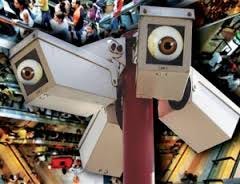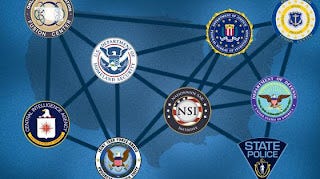Knowing police are tracking our driving has a "chilling effect" on our liberties

Knowing or suspecting that we're being watched can stop us from engaging in certain kinds of behavior, even when it's perfectly lawful. For example, it might affect our decision to go to a certain barber (what would my other barber say?), meet up with a friend (what would my mom say?), eat at a restaurant (what would my trainer say?), or take the scenic route (is it suspicious that I'm not using my normal route?). Surveillance changes the way we make daily decisions—the same way that a rapidly approaching police car in your rearview mirror may make you feel nervous even when you are driving completely lawfully.
And it doesn't necessarily matter that it's not your mom or your trainer behind the license plate reader pointed at your car. Once your location information is collected and stored by a third party, you have lost control over it, and there is no way to know whose hands it will end up in. We acknowledge this instinctively when we feel discomfort about being watched or followed by anyone, not just those who are most consequential in our lives. When people feel that their movements may be recorded, they feel less comfortable traveling freely and engaging in activities that might be controversial or stigmatizing, even when those activities are important or beneficial.
Even the police have acknowledged the chilling effects of surveillance. A 2011 report by the International Association of Chiefs of Police (IACP) noted that individuals may become "more cautious in the exercise of their protected rights of expression, protest, association, and political participation" due to license plate reader systems. The IACP report continues:
Recording driving habits could implicate First Amendment concerns. Specifically, LPR systems have the ability to record vehicles' attendance at locations or events that, although lawful and public, may be considered private. For example, mobile LPR units could read and collect the license plate numbers of vehicles parked at addiction counseling meetings, doctors' offices, health clinics, or even staging areas for political protests.
“Government tracking is not just happening at the NSA level; it’s happening at your state and local level. And there’s something that our state legislatures can do about that,” ACLU advocacy and policy strategist Allie Bohn said. “Legislators can’t regulate the NSA, but they certainly can regulate what their state and local law enforcement agencies are doing with license plate readers, and for that matter what their state and local law enforcement agencies are doing with cellphone location tracking, and I hope that they will.”
This chilling effect may be especially pronounced for license plate reader data collection, where information about where you travel can be used to infer information about who you are. In some cases, merely having your car parked in a certain area may be enough to gain law enforcement scrutiny. The IACP report remarks that it may be useful to know whether a car was parked near a domestic violence call or previous crime scene, whether or not the owner of that vehicle was involved.
Unfortunately, these examples are far from improbable. In New York City, police officers used unmarked vehicles with license plate readers to track congregants at local mosques. In Colorado, as one of our public records requests revealed (page 7933 of this document), the Adams County Sheriff's Department demonstrated license plate reader technology by singling out music lovers for surveillance, sweeping a rave party and a concert at a country-western bar (first it's the line dancers, next they'll come for the swing dancers, and then the bedroom mirror dancers?).
http://www.aclu.org/blog/technology-and-liberty-national-security/chilling-effects-license-plate-location-tracking
http://truth-out.org/news/item/17749-license-plate-scanners-black-boxes-track-location-of-millions-of-motorists
ACLU report reveals police are sending our driving habits to fusion centers:
Sensitive ALPR data is shared with other counties and potentially the federal intelligence community through a “fusion center.” A Memorandum of Understanding (MOU) signed by Daly City describes an ALPR database shared by a Bay Area fusion center and fifteen Northern California counties. Under the plan, participating counties get continuous access to each other’s data with no clear limits on what it can be used for. By combining records from multiple jurisdictions, this database has the potential to contain extensive records of motorists’ travels throughout Northern California. The U.S. Senate concluded in 2012 that fusion centers fail to make us safer, tend to be mismanaged, and needlessly intrude on Americans’ privacy, so the suggestion that counties are sharing Californians’ data en masse is particularly concerning.
ALPR technology should be used to accomplish specific law enforcement goals, not deployed as a tool for dragnet surveillance. As it stands, lax safeguards on the use of ALPR and the availability of collected data to the federal intelligence system raise substantial privacy concerns. Real safeguards formed through democratic debate can shed light on the technology’s use, and prevent future misuse.
The starting point for establishing these safeguards is to have an open discussion with local government and citizens about the risks and benefits of ALPRs. Driving may be a privilege, but privacy is a right.
http://www.aclu.org/blog/technology-and-liberty-national-security/use-automated-license-plate-readers-expanding-northern
Police spying on drivers is worse than you think: "A parody message to Massachusetts motorists"
http://massprivatei.blogspot.com/2013/07/a-parody-message-to-massachusetts.html
Police departments are using DHS grants to expand government surveillance:

A 2012 report by Senator Tom Coburn on the DHS Urban Areas Security Initiative (UASI) grant program provides good insight into that problem, pointing out that DHS does not require grantees to provide line item budget reports about how its funds were spent. To learn about how agencies spent those funds, Coburn’s staff had to go from the bottom up, asking individual departments for records containing details about grant spending. That's not a very efficient means of investigation -- and makes highly unlikely the emergence of hard statistics about the impact of federal funding programs nationwide.
But it was through this kind of bottom-up investigation that Coburn’s office learned that DHS funding included monies for license plate readers:
In Louisiana, Jefferson Parish officials sought to spend nearly $45,000 for license plate readers that have been used not to stop terrorists, but to catch car thieves.
While most of the details in the Coburn report come from local agencies, the Senator reported that the DHS Inspector General tracked down some funds spent on license plate readers. But Coburn was not pleased to discover that DHS did not measure how grant funds achieved terrorism-related public safety gains. His report comments:
Audits conducted by the DHS Inspector General (IG) reveal serious shortcomings about the benefit of certain expenditures. For example, a recent IG audit on UASI grant funding revealed that a Californian urban area purchased a license plate reader system for $6.2 million but could not explain how this acquisition identified or contributed to the prevention or investigation of terrorist attacks. Instead, the system was used to locate stolen cars or to identify vehicles with excessive traffic violations. As the IG report pointed out, measuring the contribution this program made toward first responder preparedness might include data on the number of stolen vehicles recovered or suspects apprehended, and how the system contributed to the investigation of a terrorist incident that was prevented or actually occurred. However, neither the State nor the urban area had established such indicators.
Documents returned to the ACLU by ICE suggest that ‘indicators’ of anti-terrorism success may not be what DHS is after when it funds local department acquisitions of license plate readers. That’s because, regardless of whether or not those local departments catch any terrorists with license plate readers, the federal government often gets a very specific and significant return on its investment when it showers state and local law enforcement with money for license plate readers. It gets data – a lot of data.
ICE and the FBI have lots of agents, but the police officer population in the United States dwarfs their numbers. These federal agents are not in every county and town in the United States, and so they are not in an ideal position to collect detailed data about the movements of motorists at the local level. But nearly every city and town has a police department.
When the federal government gives out money to state and local law enforcement for the purchase of electronic fingerprint or license plate readers, those very same federal agencies are likely to reap the long term benefit of access to exponentially more massive data pools containing information from every city, county and state than anything they could collect on their own.
http://privacysos.org/node/1126
UK Information commissioner blasts license plate readers:
The United Kingdom's Data Protection Act Europe's most surveilled society forbids "excessive" collection of data "in relation to the purpose or purposed for which they are processed." Police officials were unable to provide a reasonable explanation for their actions, and the unnecessary collection increases the risk that the data will be misused or unlawfully accessed by others. The issue was brought to the commissioner's attention through a complaint filed by Big Brother Watch, Privacy International and No CCTV.
Police could be forced drastically to scale back their use of ‘Big Brother’ road cameras which record the movements of millions of motorists every day.
In a landmark ruling, the privacy watchdog declared that a ring of cameras installed around the quiet market town of Royston in Hertfordshire was unlawful and excessive.
"This sends a clear message that the blanket logging of vehicle movements is not going to be within the law and it is now essential that the ICO ensures other police forces are abiding by the law," Big Brother Watch director Nick Pickles said in a statement. "Yet again we find the public placed under surveillance when the police force was unable to justify why the surveillance was necessary or proportionate. Whoever took the decision to press ahead with this ring of steel and to ignore the law so brazenly should be clearing their desk today."
Critics say the cameras amount to an ‘automated checkpoint system’.
The commissioner warned police agencies that the license plate cameras cannot be used without a clear purpose and a privacy impact assessment.
http://thenewspaper.com/rlc/docs/2013/uk-icoanpr.pdf
http://www.dailymail.co.uk/news/article-2377083/Police-forced-axe-Big-Brother-road-cameras-Town-wins-landmark-victory-blanket-use-number-plate-spies.html
British Columbia, Canada privacy commissioner rules Victoria Police use of license plate scanners violates the law:
http://www.thenewspaper.com/rlc/docs/2012/can-vicalpr.pdf


